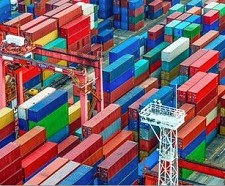U.S. West Coast Ports "Slowly Improving"
FEATURE
U.S. West Coast Ports “Slowly Improving”
Fastener importers report U.S. West Coast ports are receiving and moving goods, but are not yet fully recovered from the nine-month slowdown which ended in late February 2015.
Brighton-Best International received more than 100 containers during the second week of April when they normally would process 40, Hsieh reported. “One hundred is not easy,” Peggy Hsieh said of the workload.
“It is still not normal,” Hsieh observed. She predicted it would be the end of summer before the ports are fully back on schedule.
Shipping companies and the 20,000 dockworkers for the 29 U.S. West Coast ports reached a tentative labor deal late February 21, 2015, after negotiations since the dockworker contract expired in July 2014. The International Longshore & Warehouse Union and the shippers’ bargaining agent, the Pacific Maritime Association, agreed to “fully restore all port operations” after U.S. labor secretary Thomas Perez arrived in San Francisco to broker a compromise.
Brighton-Best president Jun Xu told FIN that ports in Texas, Georgia and New Jersey helped pick up a portion of the slack.
Xu noted the port slowdown affected the “entire U.S. economy. Everyone got delays.”
“Slowly improving,” Chuck Smith of AZ Lifting Hardware declared of the current situation during a Pacific-West Fastener Association conference session last week.
Craig Harper of WCL Company found the biggest problem during the slowdown to be the “uncertainty.” Inventory was sitting on ships with no schedule to get to the docks. “We had no idea whether it would be one week or three weeks,” Harper said during the Pac-West session.
Some distributors were approached by competitors’ customers needing fasteners, Dallas Puckett of Valley Nut & Bolt said. “You had to make a quick decision whether to make an extra buck” on the quick sale “vs. going with the long-run customer,” Puckett said.
Suzanne Dukes of Hayes Bolt found the port slowdown to be an opportunity to communicate with customers. “Hopefully customers don’t often have need to talk to us,” Dukes said. “This was an opportunity to go in to the customer and act as consultant on sourcing.”
The bottom line is that the port slowdown never got bad enough to create “an emergency situation,” Hsieh summarized.




There are no comments at the moment, do you want to add one?
Write a comment